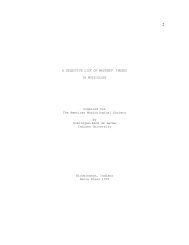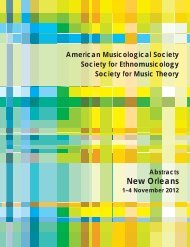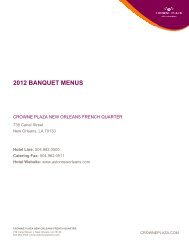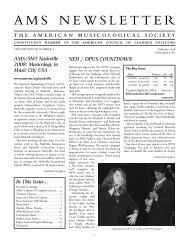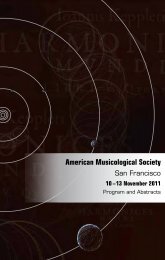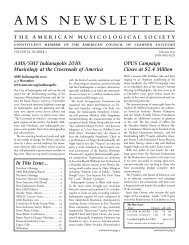AMS Philadelphia 2009 Abstracts - American Musicological Society
AMS Philadelphia 2009 Abstracts - American Musicological Society
AMS Philadelphia 2009 Abstracts - American Musicological Society
Create successful ePaper yourself
Turn your PDF publications into a flip-book with our unique Google optimized e-Paper software.
<strong>Abstracts</strong> Friday afternoon 97<br />
scholarship. How is the “liveness” of staged spectacle shaped by the mediation of the camera’s<br />
eye and the new conditions of viewing it affords?<br />
I begin by examining the different media through which live opera has been disseminated<br />
on screen: television, VHS, DVD, and the recent so-called “HD live simulcast” to movie<br />
theaters. After comparing their modes of consumption, I focus on DVD as by far the most<br />
popular medium at the present time. Drawing on the work of theater scholars, I reflect on<br />
the “textualization” of live performance effected by the digital medium, and the impact of this<br />
textualization on the interaction between spectator and recorded performance. To name just<br />
one significant aspect, the segmentation into “chapters” of a DVD is bound to influence the<br />
structural perception of the opera in question.<br />
In the second part of the paper I discuss video recordings of live performances in the context<br />
of what are usually considered the other categories of opera on screen, opera films and<br />
studio production. Examination of the criteria according to which these categories have been<br />
established reveals how the type of medium (film, TV, video) usually constitutes the starting<br />
point, followed by mode and process of production. I suggest possible additional and<br />
perhaps alternative criteria, first among them the degree to which any given video recording<br />
acknowledges the conditions of performance. Next, I examine the different modes of perception<br />
encouraged by different directorial and commercial strategies in this respect. In the case<br />
of live performances, their liveness emerges, perhaps surprisingly, as a by no means undisputed<br />
value, some video recordings ignoring it altogether.<br />
Finally, I explore how the consumption of live opera on screen is shaped by the different<br />
visual, cultural, and social contexts in which video recordings are produced, distributed, and<br />
viewed. My hypotheses are tested through a comparative look at the DVDs of two productions<br />
of Rossini’s La pietra del paragone, both released in 2008: Pier Luigi Pizzi’s for the Teatro<br />
Real, Madrid, and Giorgio Barberio Corsetti and Yannick Sorin’s for the Théâtre du Châtelet,<br />
Paris. Different productions of the same opera are seen through—or, better, shaped by—<br />
videos that invoke diverging filmic traditions, thus pointing toward different aesthetic and<br />
interpretive directions.<br />
WorlD WAr ii AnD its AfterMAth<br />
Danielle fosler-lussier, ohio state university, chair<br />
“MORE MUSIC FOR THE KINOHALLE!”: JóZEF KROPIńSKI’S<br />
COMPOSITIONS FROM BUCHENWALD CONCENTRATION CAMP<br />
Barbara Milewski<br />
Swarthmore College<br />
Josef Kropiński was one of the most prolific composers in the Nazi concentration camps.<br />
From the time of his transport to Buchenwald in March 1943, until his last days there in April<br />
1945, Kropiński —a violinist, music teacher, and choral conductor before World War II—<br />
composed over a hundred original works in a wide range of styles and genres, including songs,<br />
marches, character pieces, dances, orchestral and chamber works, operetta, and an opera. (He<br />
also created nearly four hundred arrangements of previously composed music.) Most of these<br />
works were intended for performances staged by camp inmates in the Kinohalle (the camp<br />
cinema) between the end of 1943 and the spring of 1945, with approval from the SS command.



